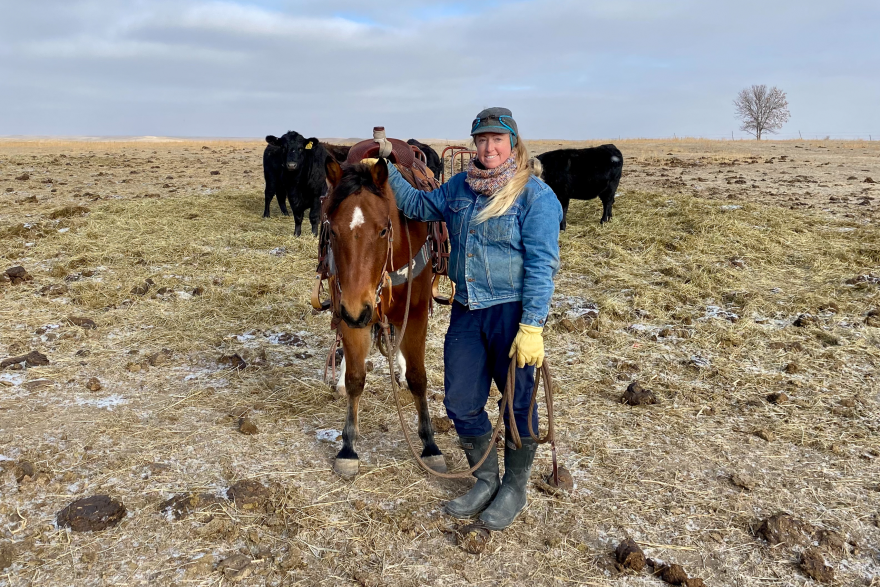A generation ago the career title of rancher often conjured images of men. In 2022 this is changing. Today of all the students pursuing Animal Science degrees at South Dakota State University 80 percent are women.
“I have known since I could walk, I just knew I was gonna stay involved in agriculture,” Dusti Berry said.
“Some people work their whole life trying to find a job or career that they’re passionate about and that they love doing and it almost stops me in my tracks because I have it. Not everyone is that lucky and I don’t take it for granted,” Dusti Berry said.
Dusti Berry talks to us from a pickup truck. She’s just finished feeding the more than 150 cattle that call the Cottonwood Research Station home. Cottonwood Research Station is located west of Philip.
A fourth-generation cattle producer, Dusti Berry grew up on a ranch nearby and today she works with the station manager, Katie Grott. Together the women do everything: implementation of research protocols, feeding, fencing, moving cattle, branding, vaccinating, pregnancy checking, calving, and equipment maintenance – if it needs to get done on the research station, these are the two women who do the work.
“It’s a lot of hard work, but it’s satisfying. We also use horses a lot and that’s really enjoyable - to work the cattle with horses and it kinda helps save wear and tear on the rangeland and it makes working the cattle easier and keeps them calmer and happier,” Grott said.
“My main goal is to make sure the animals are happy and healthy and also we have the upkeep of the place and make sure that it's presentable and that people can conduct research here efficiently and effectively,” Grott said.
Grott grew up raising horses and cattle on her family’s Indiana farm. Like Berry, she knew from a young age she wanted to stay involved in agriculture. So, she pursued a degree in Agriculture Business and Biology at Purdue University.
Her first job after graduation was managing a poultry research farm for the University of Illinois.
“I remember none of the managers of the farm units at Purdue, none of them were women. And I was actually the first woman manager at the University of Illinois,” Grott said.
Kristi Cammack said she had a similar experience. Nearly all her professors were men when she pursued undergraduate, graduate, and doctorate degrees in animal science. Cammack received her Ph.D. in 2005.
Today, the demographics are trending in a different direction, said Cammack.
At 45, Cammack is the Director of West River Research and Extension for SDSU Extension. She hired Katie Grott.
“Maybe it’s part of that trend that we’ve seen with women becoming increasingly involved. If you look at Animal Science majors and other ag majors in the colleges, we see an increasing number of women that are in those majors. I think it’s just a part of that trend of really being boots-on-the-ground, heavily involved in and taking those management positions in agriculture,” Cammack said.
Cammack grew up on crop and livestock farm near Platte. She says it was her experiences with her family’s cattle and other livestock that inspired her to pursue a bachelor’s degree in Animal Science. And it was the encouragement of an Animal Science professor, Don Marshall, that led her to pursue a graduate and eventually a doctorate degree.
“To me, growing up, I never felt limited by anything related to being female. I mean my parents were fully supportive. And of course, I married into a family where my mother-in-law ran the ranch out in the country. So, I think the message is that we are in charge of helping our young women and daughters understand that they can be anyone they want to be. And in fact, they will naturally understand that if we never put those limits in front of them,” Cammack said.
Katie Grott agrees. As the research station manager, she actually lives on site and says she appreciates the opportunities this affords her daughter, Evelyn.
“I feel like we’re able to be good role models for her and show her, that you know, “hey you could do this too, if you want.” There’s a lot of opportunities in agriculture,” Grott said.
This year the Cottonwood Research Station celebrates 80 years of continuous research. Grott is its first female manager. And she believes other women will fill her boots in the future.


